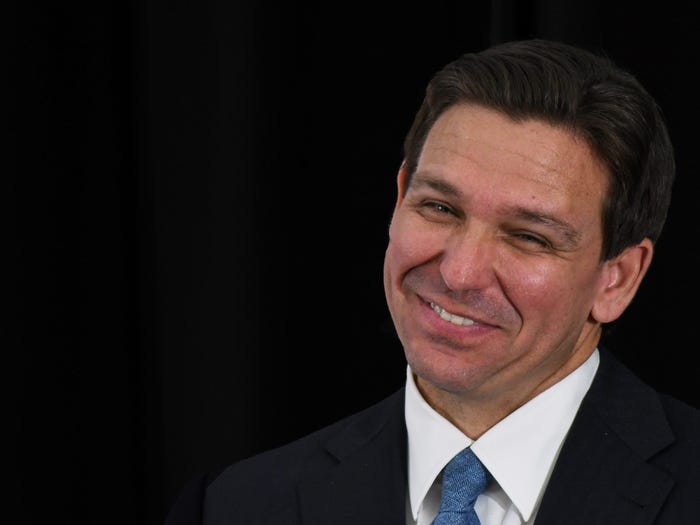
- DeSantis signed a bill into law that will hide his travel records from public view.
- The law comes as he’s expected to mount a presidential campaign.
- It’ll even apply to trips the governor has already taken.
Florida Gov. Ron DeSantis signed a bill into law Thursday that would hide records about his past and future travel, as well as powerful people he meets with, at a time when he’s widely expected to be on the cusp of announcing he’ll run for the 2024 Republican presidential nomination.
DeSantis signed the bill into law unceremoniously on Thursday afternoon, among more than 35 other bills. His office sent an email to the press that listed the bills that were now law.
Under the new law, details about the governor’s trips — whether on state planes or private, chartered flights — will be retracted, including names of staff and family members that travel with DeSantis. Visitor logs to the governor’s mansion and his office also will be hidden.
The retraction will shield information not just from journalists but from DeSantis’s political opponents, who would likely compile droves of research to use against the governor for public scrutiny. Chief among these could be instances in which DeSantis traveled with lobbyists or others who might have been trying to curry favor with him.
Wealthy donors helped pay for DeSantis’s travel during his successful 2022 reelection campaign and for him to travel to rallies to support other Republicans, according to an Orlando Sentinel investigation.
Asked about the legislation last week, during an unrelated press conference on public safety, DeSantis said the measure hadn’t “necessarily” been his idea but was “motivated by security concerns.”
“The issue is, with a security situation, how you do patterns of movements if you’re somebody that is targeted — which unfortunately I am, and I get a lot of threats — that could be something that could be helpful for people who might not want to do good things,” DeSantis said.
Under the new law, other state officials would receive the same protection as the governor over travel records, including the lieutenant governor, leaders in both chambers, Florida Cabinet members, and the Supreme Court’s chief justice.
The security argument was nonsensical to Ben Wilcox, research director and co-founder of the good government organization Integrity Florida, given that the new law will apply to past travel records.
“It strains credulity to suggest that hiding travel records could somehow prevent a security breach in the future,” Wilcox told Insider. His position is that the public should know how taxpayer money is being spent to fund the trips, particularly because DeSantis’s official stops — on everything from signing a bill into law to announcing new funding — often mimic campaign events with DeSantis ticking off his accomplishments or attacking President Joe Biden.
“How else can we know whether the travel was an appropriate use of public funds and hold those responsible accountable?” Wilcox asked.
For decades, Florida has had one of the strongest open records laws in the US, broadly providing reporters access to a wide array of documents, meetings, text messages, and emails. These “sunshine” laws, which provide public access to government proceedings, are part of Florida’s state Constitution.
But under the DeSantis administration, state agencies forwarded more than 280 public records requests to the governor for review in 2021, which delayed their release, according to a WKMG investigation.
Barbara Petersen, executive director of the Florida Center for Government Accountability, told WGCU last week that the measure DeSantis signed into law represented “the biggest assault on our public records law” in her 35 years of working on ethics and transparency issues in the state.
Past Florida officials, including 2003 Senate President Jim King, have been found to have improperly used state planes. “The only reason we know about past transgressions by senior officials and former governors is precisely because people had access to such records in the past,” Bobby Block, executive director of the Florida First Amendment Foundation, who testified against the legislation, told Insider.
Block said his organization and others are considering ways to challenge the law, and accused its proponents of trying to “prevent inconvenient facts from making the news.”
“They want to put information that was formerly in the sunshine and put it in the shade because of their own political ambitions and their desire to — dare I say — not subject their trips to public scrutiny,” Block said. “That’s not sunshine and that’s not accountability.”
The Florida Department of Law Enforcement still plans to make the total cost of flights for the year available, but it won’t be broken down by each individual trip, Block said. A better solution to assuage security concerns, he said, would have been to consider retracting specific information about law enforcement personnel, citing the number of security staff that travels with the governor as a possible option to consider.
DeSantis has not definitively answered questions about whether he’ll run for president but is widely expected to do so sometime after Florida’s lawmaking session ends this week, though an announcement may not come until June or even later.
Should he enter the contest, he’d face off against former President Donald Trump, former UN Ambassador Nikki Haley, former Arkansas Gov. Asa Hutchinson, and tech entrepreneur Vivek Ramaswamy. Sen. Tim Scott of South Carolina announced an exploratory committee and former Vice President Mike Pence is also expected to enter the contest.
Trump has relentlessly attacked DeSantis over the last six weeks, and while the governor has dropped in the polls he still remains the only hypothetical presidential candidate from a growing list that polls second to Trump.
Trump’s campaign recently criticized the governor for being on a foreign trip and book tour while Florida lawmakers were in session, circulating an email to reporters with an image headlined “Never in Town.”
Another elections related bill is headed for DeSantis that will allow him to maintain his seat as governor while running for president. The re-writing of the so-called “Resign to Run” law will also ensure that DeSantis could return to the governor’s mansion if he were to lose the GOP primary nomination contest or the presidency.









